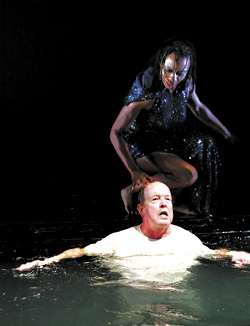Happy people are all the same, but neurotic people are each neurotic in their own particular way. Witness the sad sacks that make up the repressed and festering world of Kvetch, Steven Berkoff’s uneven but often-entertaining comedy of distinctly post-Freudian manners. Wiretapping the respective id of each busted superego, Berkoff’s play burrows shamelessly into the secret lives and silent desperation of a handful of mostly-unpleasant people, each of whom is deeply dissatisfied—nay, downright disgusted—with the way life has turned out. Their dissatisfaction and disgust is revealed as a series of increasingly blunt and brutal asides, with each spotlit basket case giving voice to the relentless interior monologue that represents the dark truth of their innermost feelings—an old familiar device, used for comic effect by everyone from Shakespeare to Woody Allen to Hanna-Barbera.
Berkoff, however, hangs his entire play on this parlor trick, footnoting every innocuous line with a barrage of psychic spleen and entrenched self-loathing. “I want to be raped!” screams the sexually frustrated Donna (the wonderful Amelia Meckler) as she climbs atop her probably gay husband Frank (Cristopher Berns), who in turn is imagining being anally gratified by his nebbishy co-worker Hal (Andy Clawson). Such moments, often hilarious, add up to a pretty cynical portrait of human relationships—misanthropy along the lines of Céline and Swift, cut for less-hardy palates with a dose of smarm and slapstick. Directed by Schmee artistic director David Gassner, Kvetch succeeds on the strength of a couple crackerjack performances and a wild, antic energy that carries the play over a bunch of rough passages.
Kvetch‘s narrative is bare-bones, structured like a sitcom from hell: It centers on the nuclear family of Frank, Donna, and Donna’s gassy mother-in-law, played with scowling, flatulent fury by Patsy Benson. The shit really hits the fan when Frank, a solipsistic, amoral cad with a heart full of disappointment and a melon full of thwarted hopes, unexpectedly brings Hal home for dinner, throwing Donna into a tornado of domestic scorn. As the dinner conversation moves haltingly and painfully from one subject to the next, the social anxieties of the three participants (the mother-in-law, stewing with self-satisfaction and feeling nothing but contempt for Frank, is simply too old to play such games) are revealed in freeze frame: Frank has a Babbitt-like need to impress Hal, but he’s ashamed of his slovenly and stupid wife; Hamlet-like Hal, ever the whiner, is virtually paralyzed by the prospect of answering questions about his bachelor lifestyle; and Donna, baffled by her idiot husband’s inability to finish a joke, is obsessed by an urgent quest to sneak away and down some Milk of Magnesia before her upset stomach gets the better of her.
With Hal gone (but not forgotten, at least not by Frank), the night ends with a very funny but rather excruciating sex scene, Donna astraddle Frank as she reveals her sexual fantasy of gang-banging a half-dozen garbagemen. Frank is nothing but a human dildo, a hobbyhorse upon which Donna can grind out her unrequited lust, and he can only achieve release by giving in to his fantasy of a bespectacled Hal coaching him in the art of sexual liberation. The scene’s hyperventilating hilarity belies a sadness as deep as it is futile.
The play’s second half centers on the relationship between Frank and his boss George (John Kobasic), a tired, defeated husk of a man who carries on empty affairs with his co-workers’ wives, women he wines, dines, and seduces while secretly hoping he won’t have to actually fuck them (what George calls with malignant glee a “win-win situation”). Kobasic, with his fierce eyebrows and Ralph Kramden–like delivery, captures perfectly the image of the once-powerful man whose games of alpha-male sexuality have become nothing but a cheap charade of virility. This act contains one of Kvetch‘s finest scenes—a stunningly choreographed dance of latent violence between George and Frank, as each airs his hatred for the other in an avalanche of caterwauling and vitriol. Both men begin speaking at once, parading a litany of complaints about the other: First George steps to the fore, increasing the volume of his bitching, while Frank recedes, providing an equally vicious but muffled roar. Then as George slowly moves back, lowering his voice, Frank moves forward, raising his. This waltz accelerates until both men are moving like some frantic merry-go-round.
The problem is, this scene doesn’t really seem to advance the narrative or make a point about anything that’s gone before. It isn’t the case that all art has to have a meaningful point to make, and much of Kvetch is quite funny and regaling. Some of it is also taxing. Berkoff’s writing seems to swing wildly back and forth: here innovative, there just short of predictable and obvious. Thanks to the cast, and especially to Meckler’s gutsy performance, Kvetch overcomes its own lack of pith. It’s more case study than story, but its empty calories are an entertaining-enough diversion.








